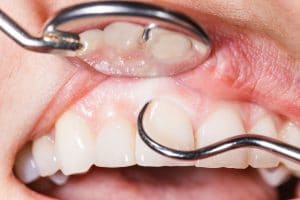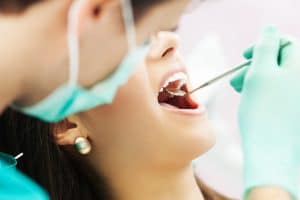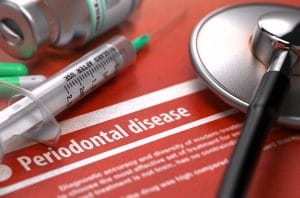 Your teeth are the most used parts of your body, and to remain strong and healthy, they’re held sturdily in place within your jawbone by their roots. Within a roots socket lay a mass of periodontal tissues that help secure it in place, giving the tooth a minimal amount of wiggle room to adequately withstand your bite’s pressure. Despite this minor elasticity, your teeth shouldn’t noticeably move within their sockets. If they do, then it may mean that your teeth at risk of loss due to insufficient support—a common result of advanced periodontal disease. (more…)
Your teeth are the most used parts of your body, and to remain strong and healthy, they’re held sturdily in place within your jawbone by their roots. Within a roots socket lay a mass of periodontal tissues that help secure it in place, giving the tooth a minimal amount of wiggle room to adequately withstand your bite’s pressure. Despite this minor elasticity, your teeth shouldn’t noticeably move within their sockets. If they do, then it may mean that your teeth at risk of loss due to insufficient support—a common result of advanced periodontal disease. (more…)
Why Periodontal Disease Control Matters
 When you notice that your gums are bleeding or that your breath seems chronically bad, you might consider the periodontal disease that causes it to be quite a nuisance. However, the truth is that it’s much more than that; periodontal disease is one of the most common chronic dental issues, and the most common cause of adult tooth loss. With over 80% of adults affected by it to some degree, controlling periodontal disease is an important aspect of many people’s routine dental care. (more…)
When you notice that your gums are bleeding or that your breath seems chronically bad, you might consider the periodontal disease that causes it to be quite a nuisance. However, the truth is that it’s much more than that; periodontal disease is one of the most common chronic dental issues, and the most common cause of adult tooth loss. With over 80% of adults affected by it to some degree, controlling periodontal disease is an important aspect of many people’s routine dental care. (more…)
Beating Gum Disease with Better Hygiene
 Fighting gum disease in its most severe stages can involve a number of specialized periodontal treatments, such as laser periodontal maintenance and gum grafting. Before it develops, however, gum disease can often be prevented with a good hygiene routine and regular preventive dental care. The key is to stay consistent in your routine; harmful oral bacteria are a constant threat, and lax hygiene is one of the most influential factors in gum disease development. (more…)
Fighting gum disease in its most severe stages can involve a number of specialized periodontal treatments, such as laser periodontal maintenance and gum grafting. Before it develops, however, gum disease can often be prevented with a good hygiene routine and regular preventive dental care. The key is to stay consistent in your routine; harmful oral bacteria are a constant threat, and lax hygiene is one of the most influential factors in gum disease development. (more…)
The Systemic Dangers of Periodontal Disease
 Periodontal disease (commonly referred to as gum disease) comes with a host of concerns that go beyond your gum tissues. For instance, along with your jawbone, your gums are responsible for keeping your healthy teeth firmly in place and their roots protected from oral bacteria. When periodontal disease sets in, the effects can include a heightened risk of tooth loss due to the effects on your gums and jawbone. The same effects can also increase your risk of systemic health issues, including cardiovascular disease, diabetes, and other chronic inflammatory conditions. (more…)
Periodontal disease (commonly referred to as gum disease) comes with a host of concerns that go beyond your gum tissues. For instance, along with your jawbone, your gums are responsible for keeping your healthy teeth firmly in place and their roots protected from oral bacteria. When periodontal disease sets in, the effects can include a heightened risk of tooth loss due to the effects on your gums and jawbone. The same effects can also increase your risk of systemic health issues, including cardiovascular disease, diabetes, and other chronic inflammatory conditions. (more…)
Am I Destined to Lose Teeth if I Have Gum Disease?
 Of all the potential causes of adult tooth loss, severe periodontal disease is the leading one among adults in the United States. Also known as gum disease, the condition relentlessly attacks your gums and periodontal tissues, eventually reaching your jawbone structure and eroding it, too. This process can leave one or more of your teeth without adequate support, and they may fall out or require extraction because your dental ridge can no longer retain them. The good news, however, is that periodontal disease is highly preventable with consistent hygiene and preventive dental care. Even if you do develop gum disease, seeking expert care from your periodontist can help you avoid losing one or more teeth to the disease. (more…)
Of all the potential causes of adult tooth loss, severe periodontal disease is the leading one among adults in the United States. Also known as gum disease, the condition relentlessly attacks your gums and periodontal tissues, eventually reaching your jawbone structure and eroding it, too. This process can leave one or more of your teeth without adequate support, and they may fall out or require extraction because your dental ridge can no longer retain them. The good news, however, is that periodontal disease is highly preventable with consistent hygiene and preventive dental care. Even if you do develop gum disease, seeking expert care from your periodontist can help you avoid losing one or more teeth to the disease. (more…)
Why You Should Quit Smoking if You Want Dental Implants
 For replacing lost or extracted teeth, dental implants are typically the most comprehensive option. Dental implant posts replace your lost teeth roots, and therefore have a profoundly positive impact on your long-term jawbone, periodontal, and oral health. However, if you indulge in smoking, then your eligibility for dental implant placement can be at risk. In fact, your periodontist may recommend quitting the habit before recommending implant placement; otherwise, your implants may not succeed in restoring your smile. (more…)
For replacing lost or extracted teeth, dental implants are typically the most comprehensive option. Dental implant posts replace your lost teeth roots, and therefore have a profoundly positive impact on your long-term jawbone, periodontal, and oral health. However, if you indulge in smoking, then your eligibility for dental implant placement can be at risk. In fact, your periodontist may recommend quitting the habit before recommending implant placement; otherwise, your implants may not succeed in restoring your smile. (more…)
How Does Gum Disease Affect Your Facial Appearance?
 When allowed to progress far enough, periodontal disease can destroy enough of your oral tissues to cost you one or more teeth. Although tooth loss can be a devastating result of the disease, it is not the end of your dental troubles. Even if you treat the disease that cost you one or more teeth, their loss may be just the beginning of a host of concerns, including the destruction of your smile’s foundation. Today, we explore the resounding effects that tooth loss can have on your oral health—specifically your jawbone—and how those effects can be seen increasingly more in your facial appearance. (more…)
When allowed to progress far enough, periodontal disease can destroy enough of your oral tissues to cost you one or more teeth. Although tooth loss can be a devastating result of the disease, it is not the end of your dental troubles. Even if you treat the disease that cost you one or more teeth, their loss may be just the beginning of a host of concerns, including the destruction of your smile’s foundation. Today, we explore the resounding effects that tooth loss can have on your oral health—specifically your jawbone—and how those effects can be seen increasingly more in your facial appearance. (more…)
A Closer Look at Why Dental Implants Are So Successful
 In the quest to replace missing teeth, you have several options. If you’ve only lost one or two adjacent teeth, then a bridge may be most appropriate. For more severe or total tooth loss, a partial or complete denture may serve you better. In most cases, however, the addition of dental implants can help your prosthesis more successfully rebuild your smile, with significant immediate and long-term benefits. Today, we look at why dental implants are so successful, and why the root-like posts are the best way to protect the rest of your healthy smile after tooth loss. (more…)
In the quest to replace missing teeth, you have several options. If you’ve only lost one or two adjacent teeth, then a bridge may be most appropriate. For more severe or total tooth loss, a partial or complete denture may serve you better. In most cases, however, the addition of dental implants can help your prosthesis more successfully rebuild your smile, with significant immediate and long-term benefits. Today, we look at why dental implants are so successful, and why the root-like posts are the best way to protect the rest of your healthy smile after tooth loss. (more…)
How Oral Bacteria Destroy More than Teeth and Gums
 Right now, there are about 10-15 billion bacteria in your mouth, classified into over 600 different identifiable strains. Many types of bacteria are essential to maintaining your body’s delicate ecological balance, and many of the microbes in your mouth do exactly that. Some, however, are dangerous, and can become severely detrimental to your teeth, gums, facial structures, and more if not addressed. Today, we take a look at the most harmful oral bacteria and how failing to control them can lead to disastrous consequences for more than just your teeth and gums. (more…)
Right now, there are about 10-15 billion bacteria in your mouth, classified into over 600 different identifiable strains. Many types of bacteria are essential to maintaining your body’s delicate ecological balance, and many of the microbes in your mouth do exactly that. Some, however, are dangerous, and can become severely detrimental to your teeth, gums, facial structures, and more if not addressed. Today, we take a look at the most harmful oral bacteria and how failing to control them can lead to disastrous consequences for more than just your teeth and gums. (more…)
How Healthy Gums Can Lead to a Healthier Heart
 Did you know that practicing good dental hygiene can reduce your risk for some forms of heart disease? Research has shown that many of the same mechanisms behind aggressive dental diseases, mainly gum disease, can also prove hazardous to your systemic wellbeing. With inflammation as the major common denominator, gum disease and heart disease are more closely related than many patients realize. (more…)
Did you know that practicing good dental hygiene can reduce your risk for some forms of heart disease? Research has shown that many of the same mechanisms behind aggressive dental diseases, mainly gum disease, can also prove hazardous to your systemic wellbeing. With inflammation as the major common denominator, gum disease and heart disease are more closely related than many patients realize. (more…)



